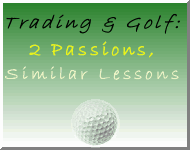 All Entries in the "Trading & Golf Series" Category
All Entries in the "Trading & Golf Series" Category
Be Specific
June 14, 2006 at 12:15 pm
The 13th hole on my home course growing up was a tough driving hole in the spring and summer. It played into the prevailing south wind with thick rough on the left and an intimidating pond on the right, forcing me to pick a very specific target to aim at in order to avoid trouble. Every day I would select the chimney of a house in the distance as my target, focusing on it alone as I hit my drive. Not only did this give me something to aim at, it took my attention away from the areas (left rough and right pond) which were sure to bring doubt into my mind. I found that I hit the fairway on the 13th as often as any other hole on the course, all because I was so specific when choosing a target. Trading with a specific game plan will have the same effect. There are countless bad things that could happen to your trade, but planning your trade and focusing on your key levels for entries and exits will help you avoid trouble and fear.
By the way, subscribing to this RSS feed will mean you won’t ever miss a post!
Jeff White
President, The Stock Bandit, Inc.
www.TheStockBandit.com
[tags]Golf, Trading, Trading Psychology[/tags]
Conservative Confidence
June 14, 2006 at 9:05 am
Rotella has a chapter in his book with the title, Conservative Strategy, Cocky Swing. The idea is to select a conservative strategy which will allow you to confidently execute it. Trading offers many different methods to find profits (even if they’re all hard to find), so why not pick one you’ve got confidence in? Every golfer can relate to those holes which tempt you to stretch your abilities. Some holes require that you hit your very best drive in order to cut the corner, but standing on that tee box with a shred of doubt will almost always leave you in trouble! Laying up with a 3-wood will give you a much larger target, and you’ll swing more confidently. Similarly, you can trade too big for your own good, but that will likely just lead to mistakes and errors in judgment as every tick is just too expensive to bear. Back down your size a bit and approach the trade with a clearer head – you’ll find that your exits will improve drastically because you’re thinking about the process rather than the result.
By the way, subscribing to this RSS feed will mean you won’t ever miss a post!
Jeff White
President, The Stock Bandit, Inc.
www.TheStockBandit.com
[tags]Trading, Trading Psychology, Golf[/tags]
Perfection Isn’t Required
June 13, 2006 at 5:05 pm
Bob Rotella wrote the best golf book I’ve read with Golf is Not a Game of Perfect. It’s full of great stories and lessons about how to perform at your highest level, whatever that may be. Trading isn’t about being perfect either! No matter how long you’ve been at it, no matter what your strategy, no matter how well the market is trending, we’re going to make mistakes as traders. Accepting that fact on the front end makes life so much easier! Do your best to minimize your errors, play to your strengths, and count up the score when you’re done.
By the way, subscribing to this RSS feed will mean you won’t ever miss a post!
Jeff White
President, The Stock Bandit, Inc.
www.TheStockBandit.com
[tags]Golf, Golf Book, Trading, Trading Psychology, Trading Strategy[/tags]
Never Force It
June 13, 2006 at 9:05 am
One of the lasting lessons my Dad taught me in golf was “never force it into the wind.” Growing up in Oklahoma and then playing college golf in west Texas, I can tell you that I’ve played a lot of golf in the wind. Headwinds tend to compound your errors by accelerating the spin on the ball, so what might normally be a slightly errant shot will often end up way off line into the wind.
Similarly, the market tends to compound our errors when we get too active under suboptimal conditions. Overtrading in a choppy market easily leads to poor performance, so the idea is to never force trades if they aren’t there. At some point, you’ll find a tailwind in the market which makes your strategy easier, and that’s the time you’ll want to be more aggressive.
By the way, subscribing to this RSS feed will mean you won’t ever miss a post!
Jeff White
President, The Stock Bandit, Inc.
www.TheStockBandit.com
[tags]Trading, Trading Psychology, Golf[/tags]
One Shot (Trade) at a Time
June 12, 2006 at 5:05 pm
Easy to say, hard to do! Golf is ideally played one shot at a time, taking each individual opportunity as one occasion to hit a shot you’ve practiced. Trading is so similar! Recent trades in which you turned a profit or a loss will have no impact on your next trade, but human nature leads us to think they may. Trading poorly can leave you timid and afraid of the next trade and the losses it may bring. On the other hand, a string of winning trades (good shots) can leave you overly confident and subject to the pitfalls of carelessness. Striving to take each individual trade as they come (one shot at a time) will help you find a balance between respect and confidence toward the trade you’re facing.
By the way, subscribing to this RSS feed will mean you won’t ever miss a post!
Jeff White
President, The Stock Bandit, Inc.
www.TheStockBandit.com
[tags]Golf, Trading, Trading Psychology, Winning Trades[/tags]
Trading & Golf Series – Introduction
June 12, 2006 at 9:05 am
Welcome to my Trading & Golf series! My first series generated a lot of interest, so here I am kicking off my second. Also, thanks to reader Ned who suggested that I do a post on this topic! Little did I know I would end up making a series of posts instead (during U.S. Open week, no less).
Trading and Golf are two of my biggest passions, and I’ve spent many years improving my skills in both endeavors. Each of them teach similar lessons on a regular basis, so I figured why not point a few of them out!
Trading and Golf are two things which can never truly be mastered, which means they present endless challenges. In both arenas, however, there is always plenty of room for improvement!
I’ve been a trader since 1998, and I’ve been an avid golfer since 1989. Although some of you might have been doing either of these for much longer, hopefully I’ll be able to share some thoughts which you find helpful. Please feel free to contribute your ideas along the way!
Golf-wise, I played competitively on levels ranging from high-school tournaments to Nike Tour events. I’ve shot under par more times than I could possibly remember, but I’ve also had plenty of 3-putts and double-bogeys along the way! 🙂 Like trading, golf will humble you when you least expect it, so it’s never a good idea to start thinking about how good you think you are! I’m a full-time trader and also have experienced a broad spectrum of results ranging from times when I didn’t know which way was up, to other times when I felt I couldn’t lose. Like golf, trading will involve some surprises, disappointments, and plenty of insights about yourself.
When it comes to golf or trading, neither one has a memory. It doesn’t matter what you did yesterday or last year, you’ll still have to prove yourself. This constant challenge can be a battle, but it can also be so incredibly rewarding. Trading can of course provide untold sums of money when you become great at it, but both golf and trading can give you extreme confidence when you overcome a challenging situation. It can be a tremendous rush to nail a trade or hit the perfect golf shot, and few things are as exciting as breaking through your old limitations to post your best trading day or 18-hole score.
This series will include more posts which will be presented in a bit more of a rapid-fire style than normal as I experiment with some shorter posts on a more frequent basis. I hope you’ll stick around and feel free to add your thoughts in the comments section anytime you feel like it! I definitely don’t know all there is about trading OR golf, so your participation is welcomed as always!
By the way, subscribing to this RSS feed will mean you won’t ever miss a post!
Jeff White
President, The Stock Bandit, Inc.
www.TheStockBandit.com
[tags]Golf, US Open Golf, US Open, Trading, Trading Psychology[/tags]






